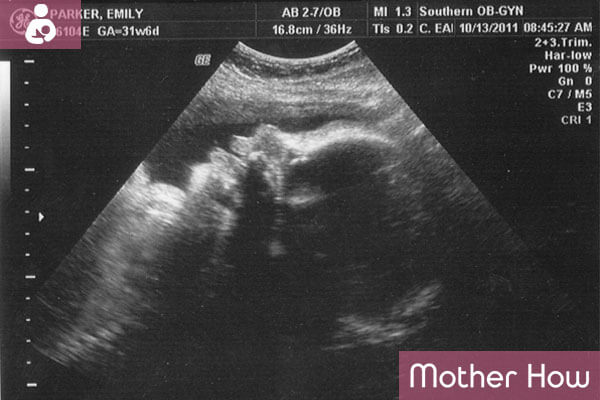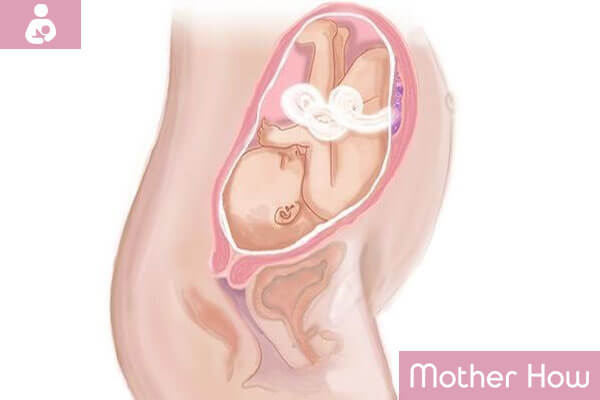Being 8 months pregnant, you already know, why pregnancy is not an easy task for the Homo Erectus. Nurturing a fetus, your body has transformed for the purpose. Your gait got heavier and the pace got slower. What should you know about the home stretch of pregnancy?
How Do You Feel?
By the end of the 8th month of pregnancy, the fundus of the uterus is gradually raising to the xiphoid process and costal margins – this is the highest level of the fundus of the pregnant uterus. That’s why the expectant mother has difficulties breathing, short breath, and discomfort during long sitting in a chair. Besides, during the eighth month of pregnancy, the mood of the future mother is constantly changing: excessive activity often turns into complete apathy. The future mother is often haunted by the thoughts about the outcome of the birth; she becomes anxious and has difficulties sleeping. However, don’t be hung up about it; it’s necessary for you to calm down and put yourself in a positive mood.
At the end of the pregnancy, the organism is an enduring psychological reorganization. And depression and fear before birth are natural, but these feelings should be banished from your head. You should find joy in your privileged situation because it’s coming to its end – you’ll soon be a mother.
To distract yourself engage in preparations for the birth: collect everything you will need in the maternity hospital, buy some beautiful things for the baby, pay more attention to your husband, go out together and watch a movie. And never forget to take your exchange card and passport with you, just in case.

The Development of the Baby
Only one month is left until the date of the birth: during this time, the baby can gain two whole pounds. And if the birth starts now, your baby will definitely survive. During the 8th month of pregnancy, the fetus is preparing for self-dependent life. Most babies have already turned their heads down to the pelvic canal of the mother. That’s why your belly is going down and your breathing is much less difficult.
The fetus is still active, but it is stirring less: it has grown and it’s cramped for it in your belly. In the eighth month, the baby’s heart is taking its final shape. But many internal organs are still improving. The respiratory system is ready to ensure a vitally important function – breathing. But ideally, the baby doesn’t hurry to come out – it requires some time for rest, growth, and improvement of central neural, endocrine, and immune systems. During this period, the little thing – now a completely formed human being – can see and hear. Its skin is smooth, without wrinkles, the fluff has vanished. By the end of the eighth month, the length of the fetus is about 18 inches, and its weight is approximately 5.6 pounds.
Visiting a Doctor
In the 8th month of pregnancy (after the 32nd week) the doctor will make an appointment for you to visit him every fortnight so that you and your baby have the best care. You will have to visit the doctor even if you feel well and have no complaints. The doctor will control the frequency of the baby’s movements, the working and form of the uterus during an external examination, check the frequency of its contractions, measure the volume of your thighs and discuss all your complaints with you.

Tests You Should Take, Being 8 Months Pregnant
- Measurements of weight and blood pressure
- Urine test for sugar and protein
- Measurement of the fetus’s pulse
- Determination of the fundal height of the uterus
- Determination of the size and position of the fetus
- Examination of the limbs for swellings and varicose veins
- Doppler echocardiography
- Cardiotocography (CTG)
Cases to Call Your Doctor
- If your breathing becomes rapid and is accompanied by your lips and fingertips turning blue, pain in your chest and rapid pulse, immediately call an ambulance and let you doctor know about it.
- If false contractions become more frequent (more than 4 per hour) and are accompanied by pain in the back, stomachache or appearance of any excreta from the vagina.
- If the first signs of childbirth appear.
Tips for a Future Mother
- To cope with breathing difficulties keep your posture and avoid excessive physical activity.
- During strong movements of the child alter your position. Take a deep breath while raising one hand above your head and then exhale while putting it down. Repeat it a few times with each hand.
- To prevent enuresis after the birth do Kegel exercise (if you don’t have any contra-indications) and exercises strengthening pelvic muscles.
- Avoid long trips, especially by plane: you can’t risk your life and health of your baby. In the eighth month of pregnancy, the birth can start any moment and at a great height without a doctor it is an enormous risk. However, if you’ve already decided to fly or leave for somewhere you should find out if there is a good doctor in the place and write down all his contacts and the address of the hospital.
- To lessen pain during false contractions try to lie down and rest. After altering of the position the contractions usually cease. If the spasms haven’t ceased but increased – call an ambulance.
- Try to take a shower instead of a bath, and if you’ve decided to take a bath ask your husband to help you get there. Put a rubber mat on the bottom of the bath to prevent sliding. And, of course, when you’ll be getting out of the bath call your husband for help again.
Changing Habits
Now, when your weight is rapidly growing to keep an eye on a correlation between the amount of liquid you drink and the amount of urine excreted later (the difference of 200-300 ml is normal). If there is less liquid excreted then it means the liquid is stalled in the organism and it is necessary to let your doctor know about it immediately. The point is that the excess liquid is disturbing the working of kidneys, putting additional stress on your heart and causing high arterial tension. As a result, your baby is suffering: it doesn’t get enough nutrition and oxygen.
To maintain your drinking regime don’t eat anything salty, smoke-dried, rich, and spicy. You “have a right” to gain only 0.7 pounds per week. And take it into account: you gain weight because your baby continues to gain weight and amniotic fluids are still gathering, but not because of your personal weight gains!
Discomforts in the 8th Month of Pregnancy
- Short breath caused by the high position of the fetus pressing on your diaphragm (it’ll, of course, cease after the fetus will come down to the pelvis after the 36th week)
- Increased sensitivity of the ribs (your baby can disturb you more than usual by its movements, sometimes you’re under the impression that its legs are under your ribs)
- Enuresis when you sneeze or laugh. This can be explained by the uterus pressing on your bladder
- Considerable weight gain
- Clumsiness
- Painful contractions of the uterus (so called Braxton Hicks contractions)
- Restless sleep
8 Months Pregnant Belly Pictures
Check out what the bellies look like in the eighth month of pregnancy.


8 Months Pregnant Ultrasound
26-30 weeks of pregnancy – ultrasound should be performed with the doctor’s referring. Whether you’re able to see your baby’s face depends on the position of your baby. If he’s lying facing outwards, for example, with a good pool of amniotic fluid around her features, you should be able to see his face very clearly.


Born in Belarus, 1985, a pedagogue and family psychologist, mother. Taking part in procedures of social adaptation of the foster children in new families. Since 2015 is a chief editor of the motherhow.com project, selecting the best and up-to-date material for those, who are planning, expecting, and already having babies.

